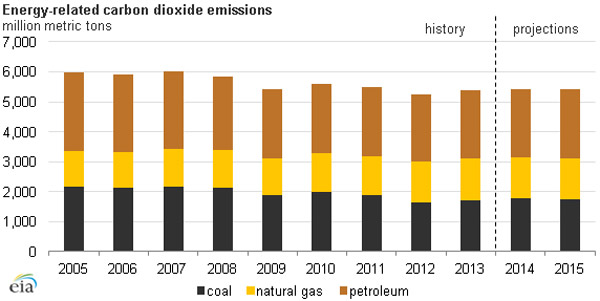Carbon dioxide emissions rose two percent in the U.S. last year, according to preliminary data from the Energy Information Administration. Emissions rose largely due to increased coal consumption, the first such rise in U.S. emissions since 2010. Still, the annual emissions remain well below the peak hit in 2007 when emissions hit 6 billion tons.
The U.S. emitted around 5.38 billion tons of CO2 last year from burning fossil fuels, up from 5.27 billion tons in 2012. The rise in emissions is linked to increased coal consumption during the second half of 2013 when rising natural gas prices made coal more competitive. Coal is the world’s most carbon-intensive fuel source.
 Male polar bear. Climate change is melting Arctic sea ice, which is impacting polar bears and other Arctic species. Photo by: USGS. |
The Obama Administration has pledged to the global community to cut emissions 17 percent by 2020 based on 2005 levels. While the U.S. does not have national legislation to cut carbon dioxide emissions, they are falling due to a slower economy, improved energy efficiency, increased renewable energy sources, and coal power being increasingly substituted with natural gas. Up-coming regulations from the Environmental Protection Agency (EPA) on new and existing energy plants are expected to further rein-in the nation’s coal consumption. Experts say that these new regulations will likely lead to emissions decreasing again.
The U.S. is currently the second largest emitter of carbon dioxide after China, and the world’s biggest historical emitter.
Global warming, driven primarily by burning the world’s fossil fuels, is already raising sea levels, melting Arctic sea ice and glaciers, and likely causing more frequent and worse extreme weather. Scientists say that if global society doesn’t rein-in emissions quickly and aggressively, future impacts could include mass extinction, agricultural collapse, water shortages, and even increased warfare.

Chart courtesy of: Energy Information Administration.
Related articles
Climate fail: Geoengineering would cool planet, but screw up rainfall patterns

(01/14/2014) For decades, scientists have been grappling with the consequences of climate change and working toward viable solutions. Climate engineering, also known as geoengineering, is the most controversial possible solution. Currently, one of the most talked about geoengineering ideas is Solar Radiation Management (SRM), which intends to block shortwave solar radiation, thus cooling the Earth to offset rising temperatures. In other words, SRM may be one way in which global temperatures could be artificially stabilized.
Down Under scorching: Australia experiences warmest year on record
(01/06/2014) Australia had its warmest year on record, with annual temperatures 1.2 degrees Celsius (2.16 degrees Fahrenheit) above the 1961-1990 average, according to a new analysis from Australia’s Bureau of Meteorology (BOM). This is 0.5 degrees Celsius higher than the previous warmest year on record—2005—for Australia. Global warming due to burning fossil fuels is increasing temperatures worldwide.
Global warming could upset Antarctic food chain

(01/02/2014) Resting near the bottom of the foodchain, Antarctic krill (Euphausia superba) underpin much of the Southern Ocean’s ecosystem. But in a rapidly warming world, these hugely-abundant crustaceans could see their habitat shrink considerably. In a recent paper in PLOS ONE, scientists predict that Antarctic krill could lose 20 percent of their growth habitat, or 1.2 million square kilometers.
Climate change drives Florida mangroves northward
(12/30/2013) A decline in the frequency of extreme cold weather in Florida has allowed coastal mangrove forests to expand northward, finds a study published this week in Proceedings of the National Academy of Sciences.
World first: Russia begins pumping oil from Arctic seabed
(12/23/2013) Oil has begun to be pumped from the Arctic seabed, according to Russian oil giant, Gazprom. The company announced on Friday that it has begun exploiting oil reserves at the offshore field of Prirazlomnoye. The project, which is several years behind schedule, is hugely controversial and made international headlines in September after Russian military arrested 28 Greenpeace activists protesting the operation along with a British journalist and Russian videographer.
World suffers warmest November on record

(12/18/2013) Last month was the warmest November on record, according to new analysis from the NOAA. Temperatures were 0.78 degrees Celsius (1.40 degrees Fahrenheit) above the average November in the 20th Century. Global temperatures are on the rise due to climate change caused primarily by burning fossil fuels, but also by deforestation and land-use change.
Reforestation can’t offset massive fossil fuels emissions

(12/13/2013) With the Australian, Japanese, and Canadian governments making an about-face on carbon-emissions reduction targets during the Warsaw climate summit, some experts are warning that the global need for solutions offsetting CO2 emissions is passing a “red line.” Land-based mitigation practices comprise one of the solutions on the table as a result of both the United Nations Framework Convention on Climate Change (UFCCC) and the Kyoto Protocol; however, a paper published in Nature Climate Change by an international team led by Brendan Mackey, has raised the looming question of whether or not land-based practices can actually improve CO2 levels as much as hoped.